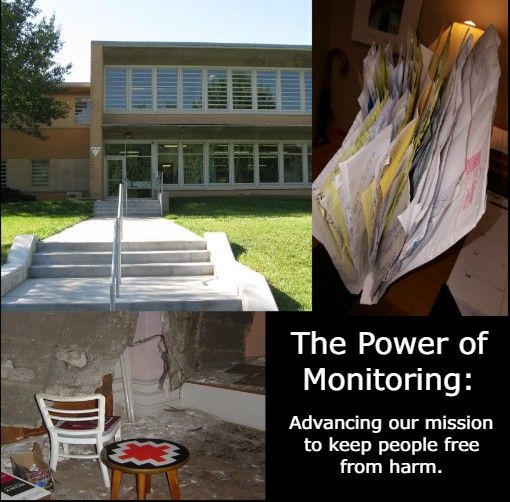
Disability Rights Nebraska sometimes tries not only to right the wrongs that people with disabilities experience, but to change the systems that contributed to the problem.
Our latest example of systemic advocacy is the settlement agreement we recently reached with the State of Nebraska in the U.S. District Court on behalf of our client, Ruth Cecetka. Ms. Cecetka, a patient at the Lincoln Regional Center (LRC), sued the state psychiatric hospital for delaying preventive care (a doctor-ordered mammogram) for more than a year, and then denying radiation treatments after she was diagnosed with breast cancer.
The settlement agreement will provide Ruth with $385,0000 in damages as compensation. Additionally – and maybe more importantly – the agreement calls for changes in operating procedures at LRC. We believe these changes will make it less likely that future patients will be denied preventive services and timely medical care. Changes include:
- Changes to the Regional Center’s intake screening forms. These will include asking patients questions about their family history of major illnesses, such as mental illness, heart disease and various cancers, and including questions for patients to answer about their last preventive care exam, such as a mammogram, PAP, or colonoscopy. Such questions are standard practice in many doctor’s offices.
- Following an assessment, any preventive care required shall be arranged with the appropriate medical provider in a timely manner. Timeliness was a main issue in this case. After being committed to LRC in January of 2013, Ruth began requesting a mammogram. By the time she received a mammogram in May of 2015 – nearly 2½ years after being committed to the psychiatric hospital - the findings were “highly suggestive for malignancy.” Afterward, a biopsy confirmed that she had breast cancer.
- Require that all team request forms and the Regional Center’s responses be copied and placed in the patient’s electronic file. As a good self-advocate, Ruth saved her request forms, making it clear how many times her requests had been delayed. However, we believe the psychiatric hospital should keep track of such requests.
- Revise off-campus transportation procedures to ensure that off-campus medical appointments are completed in a timely manner, such as having backup plans for cancellations or during times of staff shortages. If a patient is not allowed to go off-campus for a medical appointment due to behavior, Regional Center policy must spell out when the patient’s appointment will be rescheduled.
- Develop a formal Americans with Disabilities Act (ADA) policy regarding requests for reasonable accommodations. This policy will include having staff trained and required to actively assist patients with requests. It is common practice to include ADA provisions in hospital policy.
- The ADA policy will also be included in the Patient Bill of Rights and in other materials patients receive upon admission. The ADA policy will include a statement prohibiting retaliation for patients requesting or receiving reasonable accommodations. Our clients have told us their fear of being retaliated against is real. In Ruth’s case, LRC failed to provide reasonable accommodations for her disability.
- Make available relevant education and group therapy for patients with serious illnesses. This could include on-line participation in support groups, individual education sessions with medical staff, or peer support groups. Having a serious disease such as breast cancer is isolating, even in the best of circumstances. Unlike you or me, people receiving psychiatric treatment at the Regional Center can’t attend support groups outside of the facility.
- Develop a policy assuring confidentiality for patient telephone calls with off-campus medical providers. This provision addresses a patient’s right to have a private conversation away from LRC staff with off-campus providers.
- Provide the final report or reports completed by the state’s consultant regarding the use of restraint and seclusion at the Lincoln Regional Center. Federal law allows the use of seclusion or restraint only when less restrictive interventions have been determined to be ineffective to protect the patient, a staff member, or others from harm. That said, the National Association of State Mental Health Program Directors contends episodes of restraint or seclusion harm the individual and leaves facilities and staff with significant legal and financial exposure.
Though Ruth’s case had a positive outcome both for her and for other people we serve, we won’t rest on our laurels. With a focus on improving the lives of the people with disabilities and the services and supports they utilize, we will continue our monitoring efforts.


